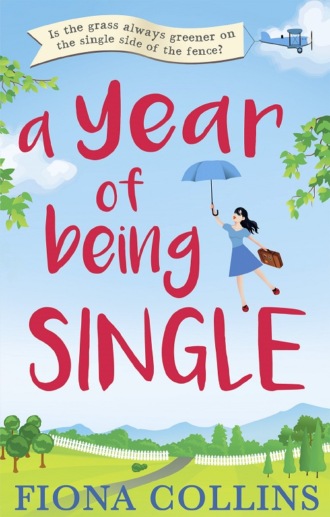
Полная версия
A Year of Being Single: The bestselling laugh-out-loud romantic comedy that everyone’s talking about

Best friends Imogen, Frankie and Grace decide to test whether the grass really is greener on the single side of the fence…
Imogen is supposed to be on the most romantic weekend of her life and instead she’s quickly realised that her current boyfriend definitely isn’t ‘The One’ and is actually One Big Mistake.
Frankie is fed up. Fed up of her good-for-nothing husband and her four, unappreciative children. Well, they hardly notice her anyway, maybe it’s time to shake it up a little…
Grace thought she had the perfect life. Gorgeous little boy and perfect, hardworking husband. Or rather, she did, until she realised her husband was shagging his ‘work’.
It’s time for a change – and to ditch the men who are dragging them down! It’s time for a year of being single. Swearing off men, these single ladies don’t need to put a ring on it…right?
Perfect for fans of Jane Costello, Helen Fielding and Fiona Gibson, A Year of Being Single is the laugh-out-loud debut that everyone’s talking about!
A Year of Being Single
Fiona Collins

FIONA COLLINS
lives in the Essex countryside with her husband and three children, but also finds time for a loving relationship with a Kindle. She likes to write feisty, funny novels about slightly (ahem) more mature heroines. Fiona studied Film & Literature at Warwick University and has had many former careers including TV presenting in Hong Kong; talking about roadworks on the M25 on the radio; and being a film and television extra. She has kissed Gerard Butler and once had her hand delightfully close to George Clooney’s bum. When not writing, Fiona enjoys watching old movies and embarrassing her children. You can follow Fiona on Twitter: @FionaJaneBooks
Thanks go to my brilliant editor, Charlotte.
To Elizabeth Davies, for reading my first ever manuscript and helping me in so many ways.
To Mary Torjussen – I couldn’t have done it without you. See you at The Ivy!
And to Phil and Emma Cunningham for inviting me to Ascot and being wonderful hosts.
Contents
Cover
Blurb
Title Page
Author Bio
Acknowledgements
Prologue
Chapter One
Chapter Two
Chapter Three
Chapter Four
Chapter Five
Chapter Six
Chapter Seven
Chapter Eight
Chapter Nine
Chapter Ten
Chapter Eleven
Chapter Twelve
Chapter Thirteen
Chapter Fourteen
Chapter Fifteen
Chapter Sixteen
Chapter Seventeen
Chapter Eighteen
Chapter Nineteen
Chapter Twenty
Chapter Twenty-One
Chapter Twenty-Two
Chapter Twenty-Three
Chapter Twenty-Four
Chapter Twenty-Five
Chapter Twenty-Six
Chapter Twenty-Seven
Chapter Twenty-Eight
Chapter Twenty-Nine
Chapter Thirty
Chapter Thirty-One
Chapter Thirty-Two
Chapter Thirty-Three
Chapter Thirty-Four
Endpages
Copyright
Prologue
They had a charter. An unofficial one. It wasn’t written on parchment scroll in swirly feather quill or drawn up on foolscap by a portly, provincial solicitor or even scrawled in biro on the back of a magazine. It wasn’t written down anywhere. But it was a charter, nonetheless, and it went something like this:
They were independent women – self-sufficient, autonomous. They could change their own light bulbs and the batteries in their smoke alarms, refill their own windscreen wash bottles in their cars, put out their own bins, carry their own suitcases, take their own cars through the carwash and unscrew the lids on their own jars. If they didn’t know how to do something they would ask each other, as one of them probably would. Or they would ask Google and work it out.
They would provide each other with emotional support and babysit each other’s children. If one needed another, they would come over.
They had freedom, they had power; they could please themselves and would make sure they did.
None of them had a man. None of them wanted a man. None of them needed a man.
And they would be single for one year to prove it.
Chapter One: Imogen
If Imogen had screamed out loud, no one would have heard her. If she’d screamed, it would have been swallowed by the unconcerned Paris traffic roaring below. If she’d screamed, nobody would have given a monkey’s. Least of all, the giant male ape inside her sumptuous hotel room.
She was standing on the tiny balcony of a massive hotel room, on the top floor of an enormous hotel. A room that she was paying for. The Ape’s contribution was zilch. He thought it enough to enjoy the room and the balcony and the whole posh Paris hotel experience as fully and as enthusiastically as possible. Especially the bar, the breakfast buffet, the three gorgeous restaurants and the extensive room-service menu. He’d enjoyed the whole trip. He’d larked about photo-bombing people at the bottom of the Eiffel Tower, stuffed his face with madeleines at Blé Sucré – whilst attempting a French accent that made him sound like a crumb-spitting Pepé le Pew – and danced up the escalator to the Louvre with a silly grin on his face… Oh, he’d had a great time.
He was enjoying himself at this very moment. As Imogen grabbed the balcony’s railing and flung her head up to the heavens and the grey Paris sky – to ask, Why? Why another bloody loser? – he was stuffed into a Chesterfield armchair and tucking into another sodding triple-deck club sandwich, irritatingly picking up each triangular section by the cocktail stick that held it together, and nibbling round the stick like an appreciative beaver. It was his fifth that weekend.
When he was done, he’d probably sniff, scratch his balls, burp and top it all off with a long and loud fart. This man couldn’t possibly be The One! He shouldn’t even have been a vague someone in her life.
He was a waste of space; he was lazy, greedy and quite repulsive. She’d been really stupid with this one. She wanted to get away from him as soon as possible. Their train home couldn’t come quick enough.
Imogen’s perfect nails dug into the palms of her Shea Butter-moisturised hands, and she silent-screamed again.
Thirty minutes before, she had arranged her legs into an attractive position on the bed. She had adjusted the long tulle skirt of her dress. Fanned her hair out on the pillow. The pillowcase alone probably cost two hundred euros. The suite was how much? Eight hundred and ninety-five euros, for one night. Imogen had thought it would be worth it. To stay in the same suite as Carrie Bradshaw in the last episode of Sex and the City. She had thought it would be romantic. It had turned out to be anything but.
Like Carrie, Imogen had been waiting, but not for Aleksandr Petrovsky, fiddling with a trendy light installation in a gallery somewhere across the city, but for Dave Holgate, who had been locked in the bathroom for absolutely ages and was showing no signs of coming out.
What the hell is he doing in there? she’d thought, picking a down feather off the bed and tucking it under the coverlet. He’s been at it for over twenty minutes!
She’d sat up and sighed. She was bored and uncomfortable, and beginning to feel ridiculous with her hair fanned out like that. She wasn’t bloody Rapunzel. She wasn’t even some young, hopeful ingénue – she was a forty-year-old woman who had been there, done that and got several disappointment-stained T-shirts. She should be well beyond hair-fanning. She should be well beyond pinning any kind of hopes on any kind of pathetic man.
At last Imogen had heard the toilet flush and Dave had come out of the bathroom, in his boxers. He’d looked dishearteningly tubby. He’d put on a fair bit of timber since she’d met him, three months ago. As he stood by the window to the balcony and scratched his large bottom, Imogen sighed again. Oh dear. It appeared she had turned him into this chubby monstrosity. It was all those meals out they’d had, wasn’t it? All those dates. Dates she’d embarked on with a hope that gradually went the way of Dave’s greedily guzzled food: down the pan.
Their first month of dating – very successful and full of laughs, actually – they went to mid-range restaurants in London. His choice. The second, they started going to restaurants in hotels. Her choice. They did the rounds of all of them: The Marriott, the Dorchester, the Landmark, Claridge’s. Imogen loved restaurants in five-star hotels. She loved the whole thing: concierges in top hats showing you in, the clack of heels across marble lobbies, the uniformly attentive waiting staff and the fact there were hotel rooms above you where all sorts of glamorous things were happening – chocolates on pillows, Hollywood stars ordering room service, lovers loving each other, secret assignations. One day she’d be proposed to in one of these hotel restaurants.
It wouldn’t be Dave who would be proposing to her, at least she hoped not. By date six and the restaurant at The Mandarin Oriental, she’d realised he was a lost cause, but unfortunately it was too late. On a high, she’d stupidly booked a trip to Paris after their first, misleadingly brilliant month. A month that had ended with an email landing in her inbox advertising Luxury Hotels of the World, and her reaching happily for the phone with unfounded excitement.
She had had to persevere with him. They had Paris; his name was on the damn tickets. She’d thought if they kept going to all those fab hotel restaurants, even after she knew they were wasted on him (though his stomach would have said the opposite), they might somehow elevate their relationship, elevate him.
They didn’t.
Equally and idiotically optimistic, Imogen had thought the romantic setting of the Hôtel Plaza Athénée might magically transform him, after three months of dating and dining, to someone she wanted him to be.
It hadn’t.
‘I’d give that ten minutes if I were you,’ Dave had said, with another giant sniff and a ping of his straining waistband.
Who said romance was dead?
He’d crossed the room and huffed his backside into an armchair, knocking a book that had been sitting on one arm to the floor. He hadn’t moved to pick it up. It was Imogen’s: The Unbearable Lightness of Being. She’d hoped to instil some culture in Dave somehow, by leaving it lying around. Fat chance.
Then he’d crossed his muscly, hairy legs. The foot that was raised pointed towards her, like a joint of meat. One big toe was nonchalantly being aired. It was a really big, fat big toe. Hairy, too. She was revolted. And not for the first time.
‘I can’t wait to get out of here,’ he’d sighed happily and inexplicably, all his actions suggesting the contrary. ‘I fancy pie and mash tomorrow night. Or we could go up Romford dogs. My treat. Who said I wouldn’t treat you like a goddess?’ He’d chuckled to himself, enjoying his own joke. Imogen had smiled sarcastically and resisted the temptation to flip him the bird. Instead she’d flapped her tulle skirt in a huff, allowing him a quick glimpse of her redundant Agent Provocateur underwear. He didn’t even seem to notice. What a waste. He didn’t deserve the underwear, the skirt, the suite. It was all wasted on the fat pig. She deserved better.
Dave Holgate had turned out to be huge mistake. She’d plumped for him for a change. A change from the steady and long-term succession of upper class twits and rich, Impressive On Paper city boys she had selected and then discarded – for being commitment-phobes, or freaks, or crashing bores, or arrogant sods, or cheats, or already married, or all of the above. She had thought a more down-to-earth man like Dave – a man not quite so Good On Paper – could give her what she wanted. Adoration, a good laugh and, perhaps, commitment; God knows no one else had come up with it.
Dave was cheeky, happy-go-lucky. He spoke estuary English, he talked about blokes not chaps, geezers not guys, unlike her posher consorts. He liked pie and mash and liquor, pints of lager, a night out at the dogs. Okay, he wasn’t as rich as the others, but, as she’d found to her cost, money wasn’t everything, right? She made a decent wage. And Dave had a very decent job halfway up a very ambitious ladder in the world of maritime insurance.
When she’d met him, at a bar in Spitalfields, she had viewed laugh-a-minute Dave as a work in progress. He wasn’t her usual impressive, finished article; he was someone who seemed impressed by her. He said he was lucky to have met her. Said she was different. Feisty, funny, classy. And she’d liked him, before he’d revealed his irritating true colours on that sixth date. (In hindsight, she wondered, did he have a rule? Six dates and it all hangs out?) He’d relaxed, got comfortable, too comfortable. He began referring to women as ‘birds’. Stroking his stomach as though it were a puppy. Eating with his mouth open. Her heart had sunk as swiftly as his decorum had deserted him.
For Paris’s sake, she’d valiantly tried to pretend the true colours weren’t shining through. She’d tried to ignore the fact that he was absolutely terrible in bed. When he’d laughed her into it that first month, he’d seemed quite good (although she was really drunk) but subsequent encounters had proved highly unsatisfying. Imogen had to do all the work, she had to go on top, he’d eaten too much, his ‘belly’ was hurting, could she shift over to the left a bit…?
The awful truth was that he was as far from her perfect man as you could get. She knew that even if he was the marrying kind, any proposal from him would be highly indecent and wholly unwelcome.
Only her good friends knew it, but Imogen wanted to get married. To everyone else, she put on a pretty good act of thinking it was all a load of rubbish, this marriage lark – she was ballsy, she was career driven, she took no nonsense or prisoners – but she wanted it. She wanted The Day, the years, the life; she wanted to be someone’s wife. When it finally happened, she would surprise everyone who didn’t know her as well and say she was trying marriage out as a giddy experiment, that if she made it to seven years like Madonna and Guy Ritchie it would be something. That it was a hoot, a mad adventure. But deep down she took it all quite seriously. That’s what this succession of no-hopers had all been about. Her end game was for one of these men to turn out to be amazing. Amazing enough to be her perfect husband.
One of these days, one of her Good on Papers would come up with all the goods.
Dave, less Good on Paper and pretty dreadful everywhere else, was never going to be that amazing guy. Imogen should have known it. She laughed to herself bitterly that she ever thought he was remotely marriage material, that she went to dinner after dinner with him hoping he’d magically become someone else.
If he had acted strangely protective over his bags or had anxiously patted his jacket pocket, as though checking something was there, at the start of the many amazing meals they’d had in Paris, she would have had a blue fit. The man was repugnant.
Three hours after she’d silent-screamed on the balcony, Imogen was on the Eurostar, sitting across from a slumbering Dave who was soporific from carbs and several hot chocolates with squirty cream and marshmallows. His eyes were firmly shut, greasy eyelids twitching slightly; hers were fully open. She not only saw the wood for the trees, she saw the entire forest and it was desolate and scrappy.
She’d had it. Men were a waste of time. Useless, hopeless, feckless disappointments, every one of them. She didn’t want to get married! What was she thinking? Why be saddled with one of the losers? She had a good life, a good job and good friends. It wasn’t like she even believed in love. Or wanted it. Love had happened to her once – just the once – and she had come out of it very, very badly. Love was not for her.
She didn’t even want to go out with any of these no-hopers any more. She was dumping Dave as soon as they stepped foot back on English soil and he’d put his last fast-food wrapper in the bin. And then she was swearing off men. For good.
Chapter Two: Frankie
Frankie’s silent scream was made at the sink, after another unappreciated Sunday roast. Three and a half hours it had taken her. Three and a half hours! Roast beef, roast potatoes, six – six! – different types of veg because the fussy so-and-sos all liked different things, Yorkshire puds, stuffing and gravy. The whole bloody works. For her family to wolf it down in five minutes without a word of praise or thanks; abandon all their plates amongst cutlery scattered like dropped straws; and push back their chairs, leaving them all out from the table like boats in a flotilla.
She was left sitting alone at the kitchen table, as usual, unhappily polishing off all the roast potatoes because she’d damn well cooked them and they were really nice, not that that any of those ungrateful sods had the consideration to tell her so. Well, her three-year-old had grinned whilst eating one, before she’d taken it out of her mouth with her hand and gleefully mushed it onto the table. It was a kind of appreciation, Frankie supposed.
From the rest of those ingrates there had not been one expression of thanks, not one murmur or slight hint that anything was remotely delicious, or even just passable. Or even edible. Although they did eat it. Some of them. Some of it. Not enough. Not enough for the slaving she’d done.
Her cheeks were bright red from the oven, her hair had frizzed up from the vapour off the vegetable pans; she had an exclamation mark of gravy on her white, straining T-shirt.
As Frankie scraped four whole starving children in Africa’s meals into the stinky pedal bin and clattered the dirty plates into the sink, her silent scream spiralled upwards like steam from a boiling kettle.
Last night Frankie had run away for the night to the local GetAway Lodge. An out-of-the-blue, unprecedented, solo flight away from the house and the husband and the four children. A long-overdue escape.
She’d been dreaming of it for months. Every now and then, in that house, she had imagined what it would be like to just take off to the local budget hotel, on her own, for a night of solitude. For a single night away from it all. She’d had that GetAway room in her mind’s eye like a beacon in the dark. She’d craved it. She could see it. She could almost smell it. Clean, sterile. A navy blue headboard and a single, solitary scatter cushion. An inexplicable strip of shiny material running near the bottom of the bed. A dark brown wooden unit housing a television. A black and silver kettle. A small wicker basket containing packets of not-very-nice biscuits and diddy milk cartons and sachets of sugar and sweeteners: these meagre offerings would have to be supplemented with a carrier bag of chocolate and treats from the nearby service station.
There would be a bathroom that smelt of bleach and had three toilet rolls, one on the holder and a tower of two on the floor, on a silver stick thing. A single wardrobe with hangers that couldn’t be wrenched from the rail. A rough, thin dark blue carpet.
She would add magazines, a book and silence. Bliss. Peace and quiet. No one to talk to. No one to talk to her. No one to bother her. More than just ‘me’ time. Way more. Time to save herself.
Yesterday, she’d finally gone. She’d fled to The GetAway Lodge on reaching the end of an extremely frayed tether that had been fraying for years.
It had been just after three on Saturday afternoon and Frankie had been upstairs considering whether to tidy the children’s bedrooms or not. They were all absolute tips and if she tidied they would only be absolute tips again in a couple of days. What was the point? She’d decided not to bother. On her way down she’d noticed an open screwdriver set on the hall floor and was coming to tell her husband, Rob, off about it. She found her family in the sitting room and had stood in the doorway, surveying the scene.
The carpet had been used as a litter bin. All her carefully (long ago, when she thought it had remotely mattered) chosen sofa cushions had been thrown all over the place; one was even balancing on top of the television, which was blaring way too loudly. Children were draped on the sofas and the floor, all eating something they shouldn’t. One was meandering around with a piece of French bread in her hand, dropping crumbs on the carpet like an errant Gretel from Hansel and Gretel. There was lots of annoying larking about. Noise. Mess. Chaos. Downright disregard.
The meandering child kicked a small yellow football (long since banned) against the radiator. It made a jarring, reverberating thwack and a wedding photo in a silver frame, sitting on a small shelf above, wobbled then fell with a heavy plonk face down on the carpet. It was a wonder it hadn’t smashed. Nobody moved to pick it up. The kids carried on screeching and larking about. Rob lay on the sofa watching Deadly Sixty and let a second Mars Bar wrapper fall from his outstretched arm onto the carpet.
It was nothing out of the ordinary. It was a scene that was pretty commonplace in that household. But Frankie had suddenly pictured herself standing in exactly the same spot five years from then. Ten years from then. Standing in the doorway, with everyone bigger (including Rob, probably, if he carried on eating all that chocolate) but absolutely nothing changed. Chaos, disorder, disregard. Nothing would ever change, would it?
‘Would anyone notice or care if I just left you all to it?’ she’d said.
There was silence.
‘If I just walked out and didn’t come back?’
Still silence.
Something crunched within Frankie. A switch that had been threatening to be pressed clunked down with a thump. She’d had enough. She turned and slowly walked back upstairs, like a robot.
It had all ground to a halt. Her enthusiasm for family life. Her energy for any of it. Her cooking mojo had been worn down to a nub. It had disappeared on a wave of non-appreciation and apathy. She didn’t want to iron another work shirt. She didn’t want to pick up another cowpat of compressed jeans and pants that Rob simply stepped out of before getting into bed. She didn’t want to look for another missing item whilst a shouting man stomped round the house. She didn’t want to load or unload another dishwasher. Or put anything else in the bin. Or answer any more questions. She loved them all so much – well, Rob, not so much, let’s be honest here – but they were driving her mad.
If she ever got time to do a full day of housework and get the house pristine, there were five brilliantly effective saboteurs who could trash all her good work in seconds. There really was no point. And she had a few stock laments that she trotted out almost daily to completely deaf ears: ‘Why is there cheese all over the floor?’, ‘Why does no one, no one, hang up the bath mat but me!’ and, ‘For the love of God, can’t you, just once, put things away!’






